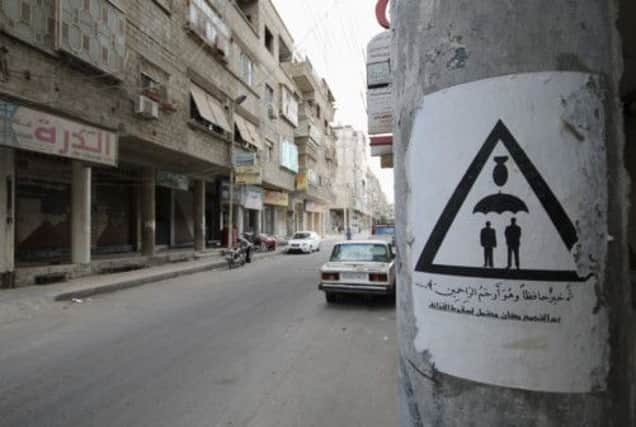Syria: Impact of sarin gas attack east of Damascus


Mohammad’s father, who rushed to the scene to help survivors, died from the effects of the sarin, as did his mother and five brothers and sisters who stayed at home.
The teenager now lives with a cousin amid the ruined streets and half-collapsed buildings that scar the Zamalka neighbourhood and other districts of the Ghouta region on the edge of the capital.
Advertisement
Hide AdAdvertisement
Hide AdPerhaps numbed by more than two years of bloodshed, he sheds no tears over the 21 August sarin attack which killed hundreds of people and brought the United States and France to the verge of air strikes against president Bashar al-Assad’s forces.
“We’ve been seeing people martyred every day – why not my family?” he said. Young men surrounding him nodded in agreement.
The rebels and their Western backers blame Mr Assad’s forces for the attack, which they say killed 1,400 people. Authorities say rebels carried it out to provoke Western intervention in a civil war which has killed more than 100,000 people.
Like most people in Ghouta, Mohammad vows to remain steadfast until Mr Assad’s overthrow – a still distant goal after military gains by the president’s forces.
He has become an integral part of a community struggling to administer itself despite clashes with government forces and a 13-month siege that leaves everyone hungry and is starting to starve the youngest and most vulnerable.
Every day, Mohammad shows up to work at the field hospital near his home. Thin and child-like for his age, he is too small to bear arms but he resembles the men with his stoic appearance, broken occasionally by a smile.
Such is life in the rebel territory linked to central Damascus only via two government checkpoints. There, soldiers confiscate food, baby milk and medicine and at times refuse entry even to people who have queued for hours.
The handful of doctors complain that dysentery and a lack of antibiotics endanger lives. They say the siege is starting to cause malnutrition among pregnant mothers and children, and that some babies have died of starvation.
Advertisement
Hide AdAdvertisement
Hide AdThe one thing that East Ghouta has in abundance is men willing to fight. However, supported by financing from underground charities and fundraising by families abroad, it has also set up a network of pro-rebel organisations tackling the community’s medical needs, communications, humanitarian relief, education and sanitation, and ensuring something that approximates to the rule of law.
When the sarin was unleashed on east Ghouta, dozens of teenage nurses administered injections of atropine – a sarin antidote – to survivors. Many did so at their own peril.
Sixteen-year-old Faris, whose home is a short bike ride away from where the chemical rockets fell, woke early the following morning unaware of the calamity that had occurred.
He learned about it at 7am, on his way to the bicycle shop where he works before his shift at the field hospital.
He rushed to the hospital and treated dozens of people.
“I was shocked. I’m still remembering things that I didn’t at that time,” he said.
Survivors describe the events as a blur, punctuated by moments of nightmarish lucidity. There was the graveyard that gave up its dead as relentless bombardment pounded its grounds.
There were living people mistaken for dead, thrown in among the bodies awaiting burial, until a movement of the head or faint moaning saved them.
People insist they took extra care that day to ensure that no body was lowered into the mass grave before a final confirmation of death by one of the few doctors there.
Advertisement
Hide AdAdvertisement
Hide AdThey continued to bury their dead for 16 hours, then found more bodies trapped inside homes for several more days during which fierce government bombardment continued.
“We found entire families dead in their homes, and no-one in our community knew who they were,” said an army defector and media activist who used the nom de guerre Mohammad Salahedinne.
Mohammad al-Zeibaa, asked to name the fallen in his family, he began with the distant relatives first, and continued in a soft but matter-of-fact voice.
“Sheikh Rashad Shams died, and his wife Baraa Nadaf. Shifa Shams. Shayma Shams. Mawada Shams and a boy she was due to give birth to in a week. Those were my maternal uncle’s family.
“Then my paternal uncle’s family: Anas al-Zeibaa, Mahmoud and Ahmad al-Zeibaa, and Khaled and Mashhoor, my cousins. And my parents, Nasib al-Zeibaa and Moameneh Shams and, what’s his name, Samer al-Zeibaa, 21, the eldest.
“Then Aya, Fatimeh, and who else? Oh yes, Asma al-Zeibaa, and the last one Abdullah al-Zeibaa.”
Asked who was his favourite, he smiled and said it was four-year-old Abdullah.
• The writer of this piece must remain anonymous for security reasons.
SEE ALSO: